Inside Decentraland, the surreal Second Life for crypto true believers
Second Life meets libertarianism. It's somehow more fun than it sounds.
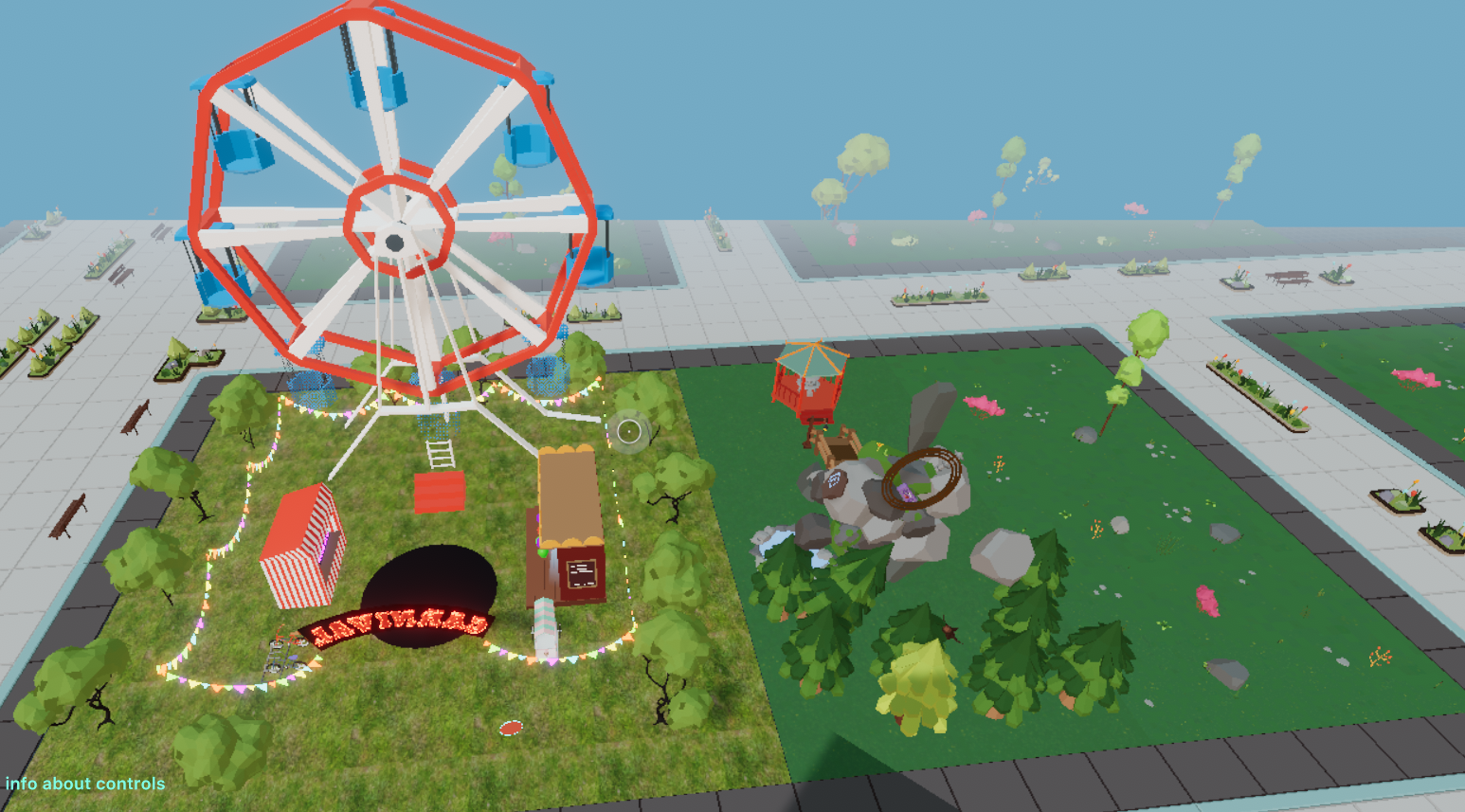
A desert island covered in swords, skulls, plundered loot, and bottles of rum. A picturesque farm on rolling green plains, where any player can pluck the fresh produce off the fields and combine them into a country meal to enjoy with the livestock. An austere, concrete mausoleum, filled to the brim with charts, integers and an echoing voice educating me on the finer points of crypto economics, coin development, and artificial scarcity. A glittering casino, where you can put all of your hard-earned crypto on black. These are just a few of the landmarks I discovered during my time with Decentraland, the answer to the question "What if Second Life had a strong libertarian bent?"
Like Animal Crossing or VRChat, Decentraland's gameplay loop is built around the humble act of existing; to explore the works of others, to marvel at the human potential for creativity, to meet and collaborate with other souls. Like Second Life, it is a vast virtual world—except, in my experience, it's completely devoid of other players. This is a multiplayer game, which made the lack of other avatars confusing, even eerie. But unlike those other, more touchy-feely experiences I mentioned, Decentraland comes with a stringent market fundamentalist bent.
The bloodsucking powers of an unregulated real estate industry has finally arrived in videogame form.
Every piece of content in the game is owned, completely autonomously, by the players. They barter for property ownership, cosmetic gear, and even player names through a real cryptocurrency called MANA that's powered by the Ethereum blockchain. That desert island doesn't belong to Decentraland's publisher. Instead, it's an environment some player somewhere owns, even after they uploaded it to their tiny slice of Decentraland's legally perplexing landscape.
Unlike every other multiplayer service on the planet, where you cash your hard-earned wages in exchange for game-specific tokens like VBucks and Riot Points at a fixed exchange rate, Decentraland offers up full private property in anarcho-capitalist fashion. Here's Federico Molina, the game's marketer, explaining how they seeded the game world in the first place.
"Genesis City, Decentraland's first map, is made up of 90,601 parcels of LAND, [the in-game geometry that players fill with their content.] Back in December 2017, they were sold off through an initial auction. People spent over 161 million MANA to buy a total of 34,356 parcels, which at the time amounted to roughly $30 million USD," he says. "These parcels were distributed to individuals and groups within our community, and the proceeds, the 161 million MANA, were [destroyed.] This way, the benefit was distributed equally among all MANA holders, instead of exclusively by the development company."
Players develop their LAND by either generating assets through Decetraland's own SimCity-like terrain modifier, or by importing 3D models through external software like Blender. This, theoretically, builds value. Cosmetic gear, like T-shirts and hats strapped to an avatar, are all independently owned as well, meaning you can absolutely sell a cool pair of polygonal jeans to an envious friend for extra pocket money. Some players (let's call them serfs) don't have the cash to buy their own LAND. In that case, they often take out a lease from richer players, so they may run their own businesses while paying royalties to the bossman.
The bloodsucking powers of an unregulated real estate industry has finally arrived in videogame form. Eat your heart out, Tom Nook.
The biggest gaming news, reviews and hardware deals
Keep up to date with the most important stories and the best deals, as picked by the PC Gamer team.
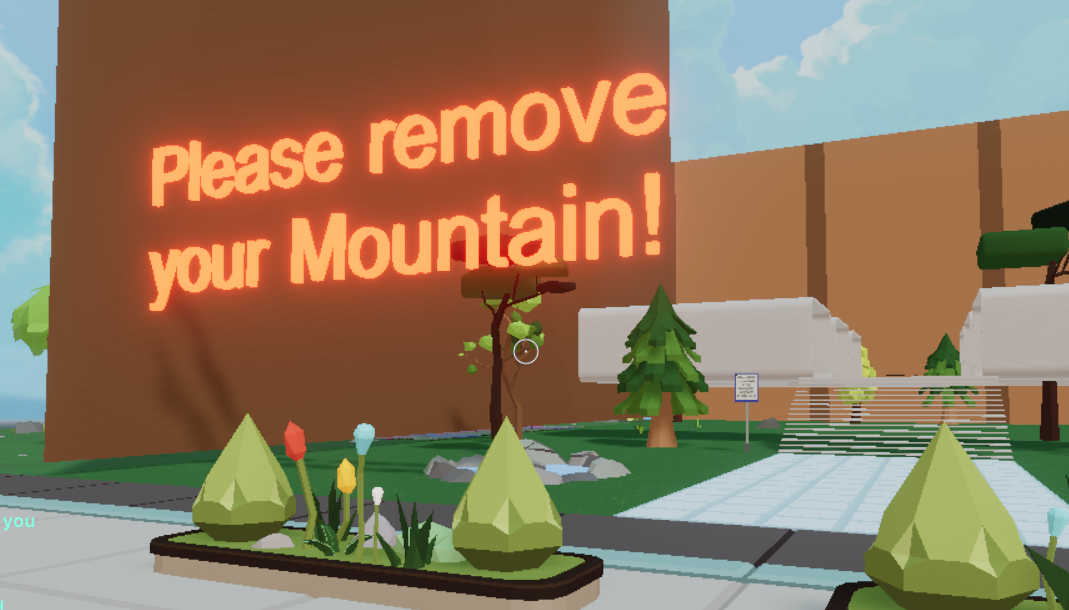
Decentraland is a truly fascinating concept. It peels back like an onion, revealing a Randian fever-dream built with Roblox textures. Anyone can explore Decentraland from their browser, as long as you first download a crypto wallet extension called Metamask. Molina recommends visiting the Museum District, where deedholders have constructed a network of digital art—put on display with reverence, like a cyberspace version of The Lourve.
Chateau Satoshi, on the far edge of the Vegas City district, is Decentraland's first casino, where you can let your hard-earned MANA, (or dummy freeplay coins if you're a coward) roll on the automated roulette wheels and slot machines. Infinity Engine is a strange, cowboy-themed FPS that someone airdropped right in the middle of the game map. Your goal is to mine gold and coal from a dirty quarry, load it up on a train, and shoot the bandits on your tail. It plays like a game-jam proof of concept baked into a larger videogame. The more industrious of you might prefer The Crypto Valley, which attempts to be Decentraland's answer to the Bay Area tech boom. Wander its streets, and pitch your ICO in a plush, virtual boardroom.
All of this is fascinating, and weird and extremely emblematic of the confusing time we live in where material wealth feels extraordinarily difficult to define. If only the act of playing Decentraland was as fun as its concept.
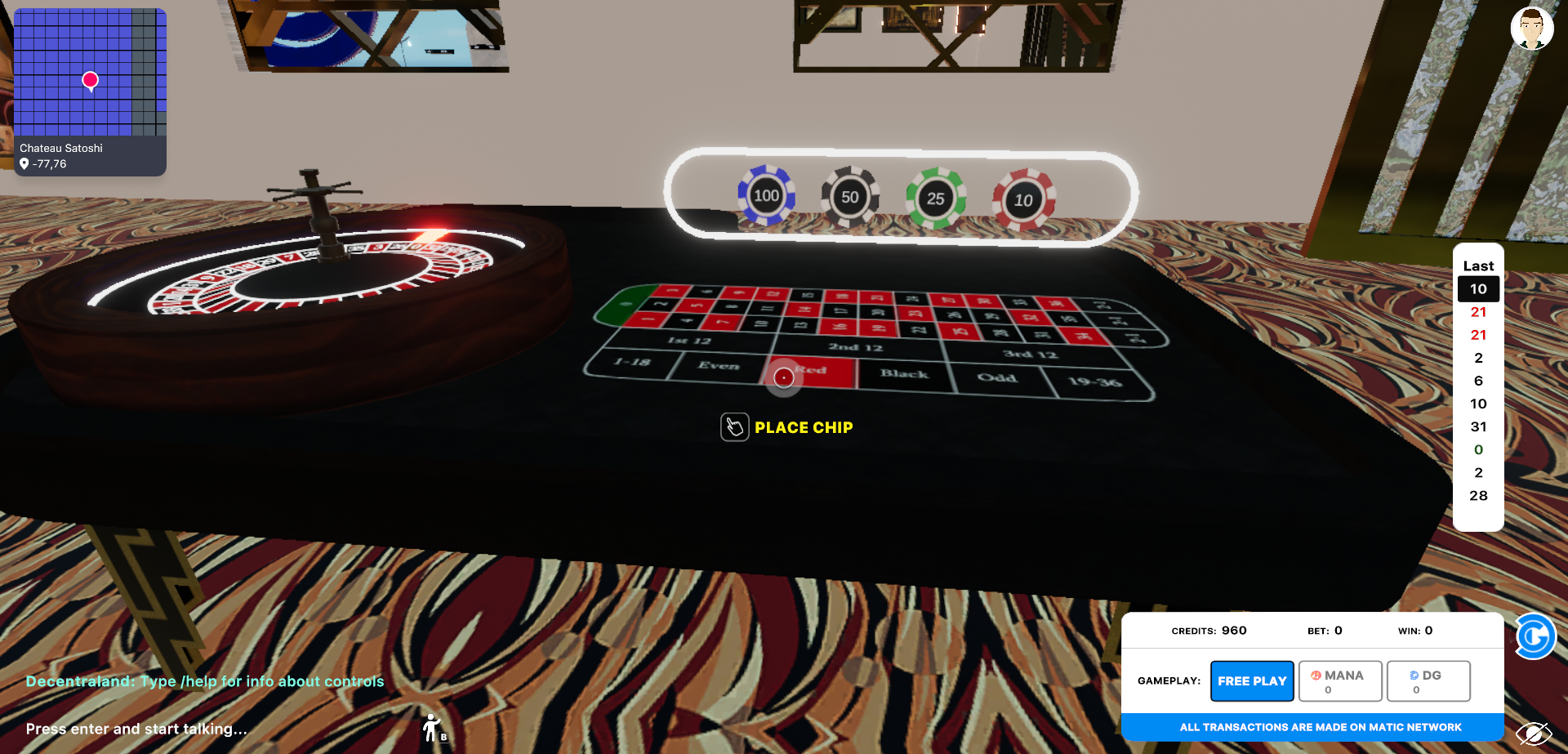
Ghost in the crypto machine
Decentraland officially launched this year but has been in some form of development since 2015. It is a rickety product. I noticed a number of frame-rate hitches, texture pop-ins, and weird screen-scaling bugs in my time probing this barter commune. There were brutally long loading times warping in, and around, the map, and oftentimes the whole authentication process would hardlock as I was booting it up.
More disappointing than that though: I truly didn't see a single other soul during my time in Decentraland. Nobody, from the museums to the pirate's cove.
I've never encountered a video game that's so reliant on its own corresponding metagame. In fact, I'd say the metagame is the game here. Venture to the official Discord, and the hustle and bustle of this vicious marketplace is alive in a way that you simply can't sense by exploring the virtual world. Hundreds of them congregate in dozens of different channels, some dedicated to vendors, hiring boards, developer feedback, and community salons for each of the different districts on the map. 3D artists will post screenshots of the models they've created—a patch of trees, a park gate—which they'll happily sell to other in-game developers at a price.
"If there are any LAND owners that would like custom 3D models or custom made scenes let me know, I'm up for any design task," one writes.
LAND traders post the coordinates of their own plots, hoping to upgrade their own lot in life. "Great fashion district location with basic builder content! One of DCL's most developed locations," echoes one ad, hoping to flip their deed like a digital version of the Property Brothers.
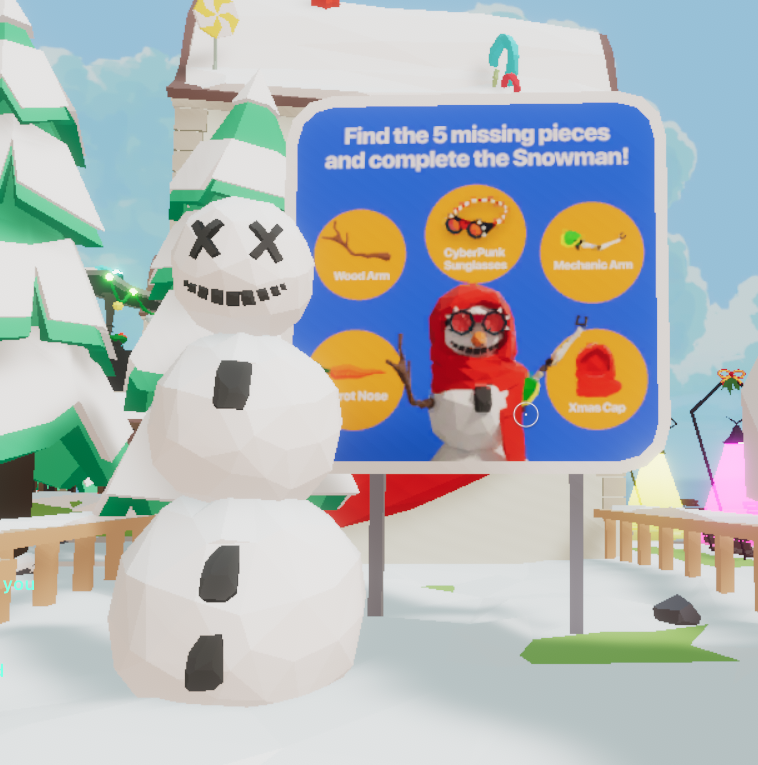
In the channel dedicated to the Virtual Reality Shopping District, one of Decentraland's cyberpunk commerce hubs, a user posts a screenshot of a domed, pink-neon building called SUGAR VRX. "Announcing a new club at VRS Distict!" they write. "Come listen to regular electro and techno music genres."
Another poster wants to recruit a handyman to construct a digital billboard. "I am looking for someone who could build a giant interactive wall on our land. It would need to be written on, and be able to add a picture or advertisement on it after someone pays MANA to do that," they write. "Contact me if you are capable and willing to work on this to discuss. Payment in MANA or crypto."
This is the age of precarity.
Here's another huckster, trying to unload some cosmetic gear.
"30 Pineapple glasses for 3000 MANA, 100 MANA each! The price on these seems to double every week now," they write. "The pineapple glasses make sense to pump since they are the only glasses in Decentraland under 500 MANA. The Spy glasses are the next tier but start at 500 and quickly go up from there. The city sneakers pumped for similar reasons."
Three emojis are attached to the post in response: One rocketship, one flame, and of course, one pineapple.
There is no better distillation of the Decentraland mystique than the forums, Twitter accounts, and Discord rooms on the game's periphery, and I'm not totally sure if that's an endorsement or an indictment. By far, my favorite denizens are those who are selling off usernames at a taxed MANA cost. ("Bullmarket" and "Nessie" are currently up for sale. "KurtCobain" is going for 10,000 MANA.)
It makes you wonder what the rest of the multiplayer landscape would look like if everything was for sale. Is this a dystopia? Maybe, but I can't stop looking at it.
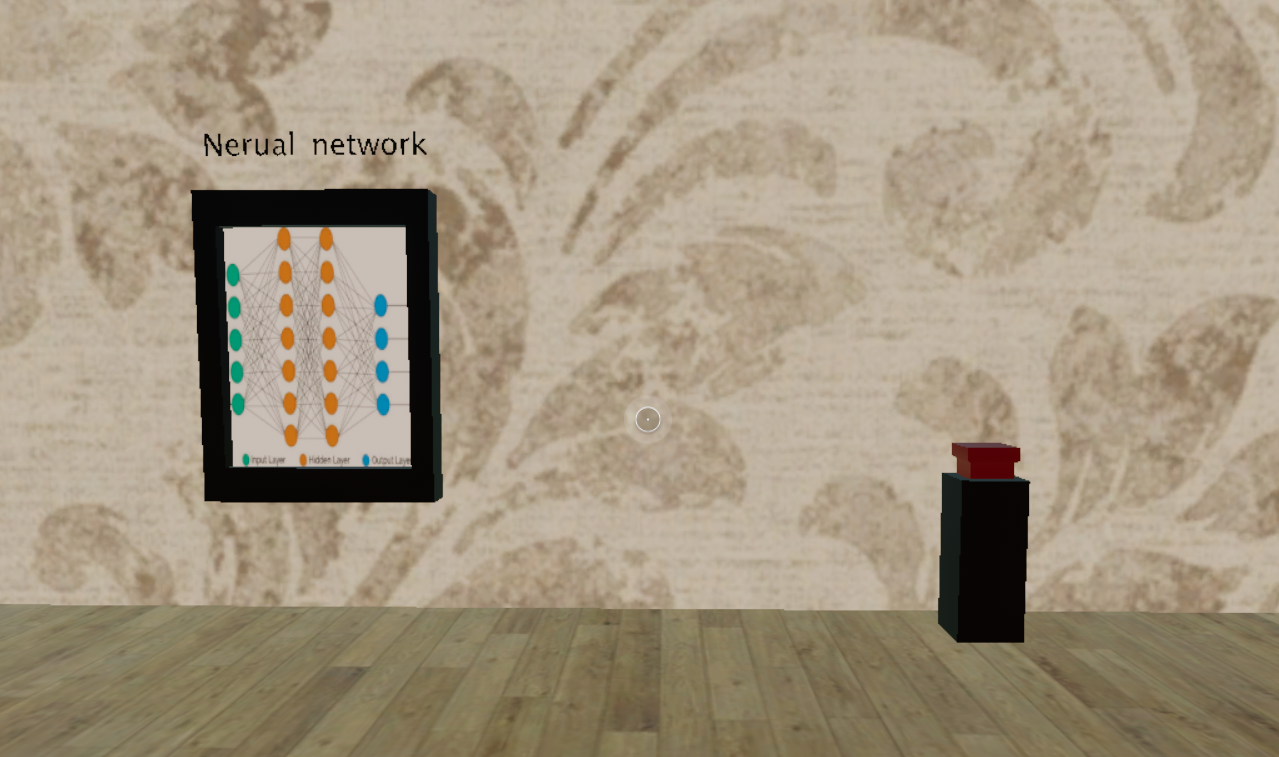
One player, who goes by Anorak, clued me in on a cultural issue that's putting pressure on the Decentraland economy right now. MANA is a cryptocurrency, and Decentraland, by its very nature, exists without any internal trust-busting firewalls to slow down a monopoly. (League of Legends' Champions are sold at a flat price and aren't a scarce commodity. Decentraland's LAND is not.) According to Anorak, the cost of a chunk of LAND in the game is so high, that a lot of players say they can't afford to buy in.
Anorak has been fascinated with the metaverse Decentraland is building for a long time, and he's accumulated a lot of in-game capital along the way. So, he decided to allow anyone to apply and develop on his own LAND, rent-free, as a way to pay his investment forward.
"I saw a way to attract new and hopefully talented developers to Decentraland and I went for it. I hope to at least bring in one more very talented developer to the game," he says. "I truly hope this action inspires other LAND owners to do the same."
We live in a time where the stock market is tanking and everyone's employment hinges on a paper-thin bubble. This is the age of precarity. Crypto diehards have always pushed the coinbase alternative as a way to separate yourself from the whims of global capital, and an attempt at a meta, off-the-grid utopia like Decentraland is a firm articulation of that promise. Will it work? Who knows, but it is telling that people like Anorak have entered their humanitarian period to desperately try to keep that dream afloat—giving back to the laborers underneath the boot with one of Decentraland's very few nonprofit initiatives. Maybe there is hope for us after all.
"This Land is for the community to build on," he says. "There are many others investing their time, money, and effort into Decentraland. I am just trying to do my part."

Luke Winkie is a freelance journalist and contributor to many publications, including PC Gamer, The New York Times, Gawker, Slate, and Mel Magazine. In between bouts of writing about Hearthstone, World of Warcraft and Twitch culture here on PC Gamer, Luke also publishes the newsletter On Posting. As a self-described "chronic poster," Luke has "spent hours deep-scrolling through surreptitious Likes tabs to uncover the root of intra-publication beef and broken down quote-tweet animosity like it’s Super Bowl tape." When he graduated from journalism school, he had no idea how bad it was going to get.

